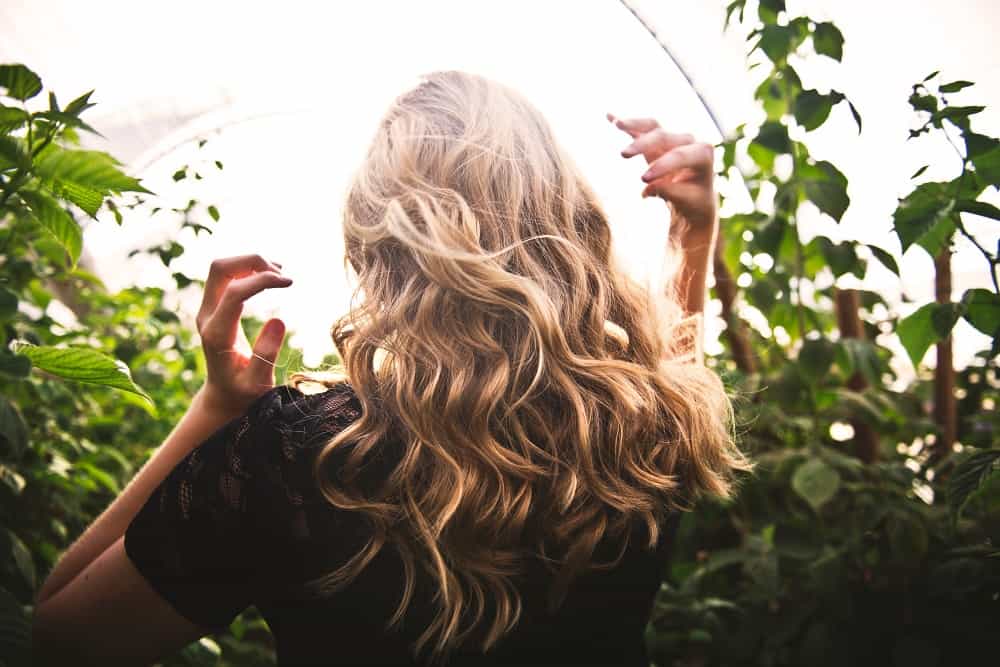How I Wash My Hair with Bicarb and Vinegar
Most people are a more than a little intrigued when I tell them I wash my hair with bicarb and vinegar. (The ones that aren’t? They either say, me too. Or they raise their eyebrows in slight alarm!)
Then of course, everyone wants to know the specifics. How does it work? How is it applied? How often do I need to wash my hair? All great questions. If this has been puzzling you, today I’m going to share some answers.
If you’re really not up for trying it yourself, I’ve also shared a post on alternative plastic-free hair shampooing options. But before you head over there, why not read this anyway – you might be pleasantly surprised!
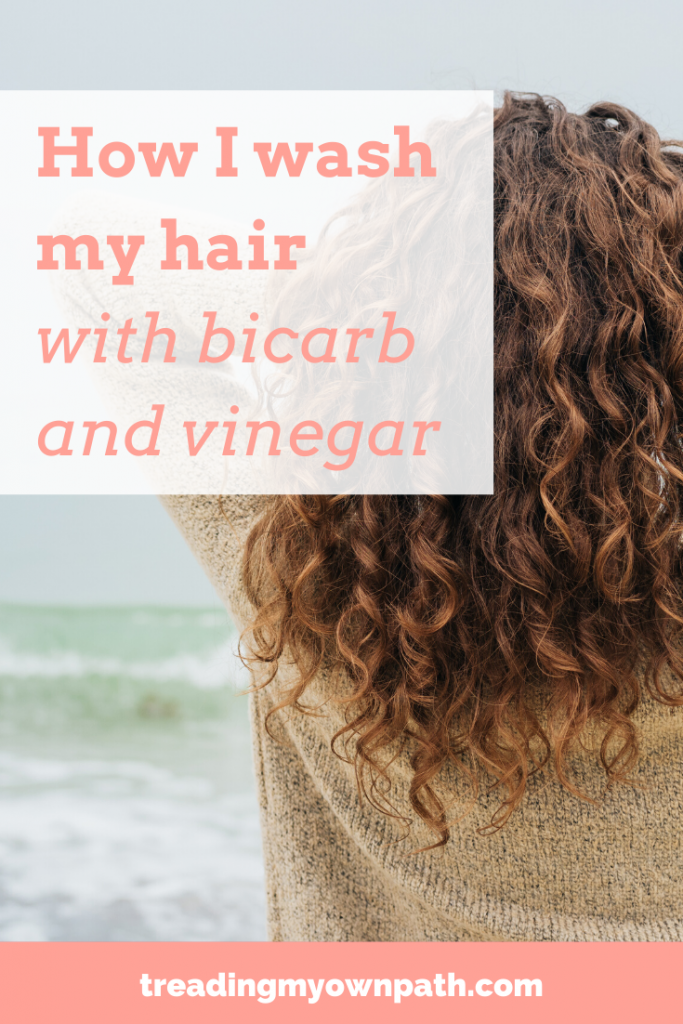
Washing My Hair With Bicarb and Vinegar
I’ve been washing my hair with bicarb (sodium bicarbonate, also called bicarbonate of soda or bicarb soda) and vinegar since 1st June 2014. I wrote a blog post about it at the time, along with my reasons why (aside from avoiding the plastic bottles). Three years later, I’m still using it, although I often use rye flour as an alternative to bicarb (I’ll talk about this later).
Here’s a picture from the first washes back in 2014…
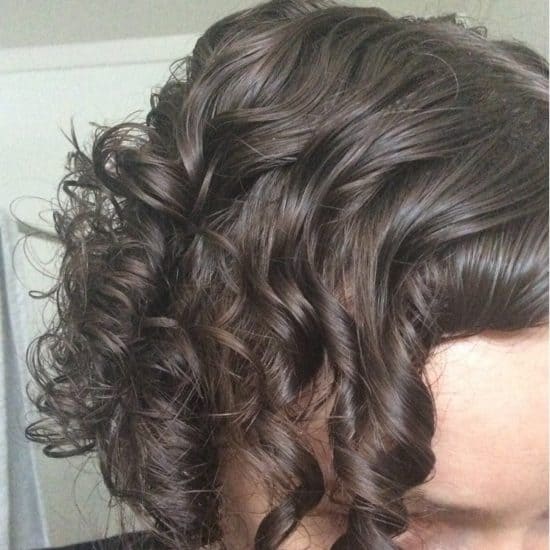
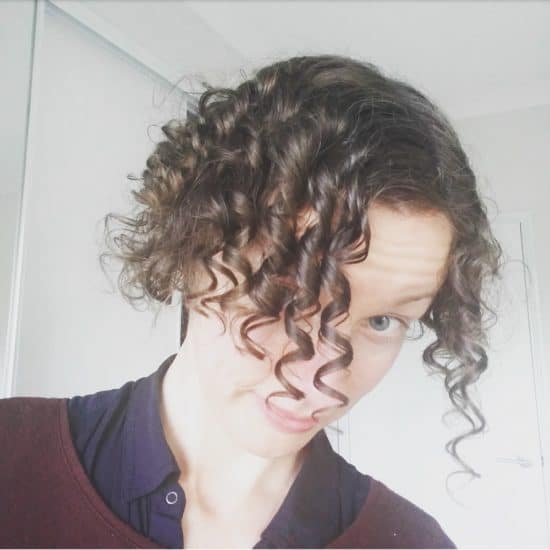
…and here’s one from this week.
I’m definitely a convert.
So how does it work?
How much of each (bicarb and vinegar) do you use?
I have slightly-shorter-than-shoulder-length hair, and I use between a teaspoon and a dessert spoon of bicarb per wash. This is my shampoo replacement. I use 1/8th cup of white vinegar, diluted to a cup with warm water, as my conditioner replacement.
How do you apply bicarb and vinegar to your hair?
I mix the bicarb with a small amount of water to make a watery slurry (bicarb is water soluble). I apply to my hair, rub in (you wont be able to feel it like you can regular shampoo) and then rinse off with warm water.
I pour the vinegar/water mix over my head slowly, rub in, and then rinse off as I would regular conditioner.
I towel dry my hair as normal.
What containers do you use to store them?
I don’t keep them in the shower. I keep a jar of bicarb under the sink, and a bottle of white vinegar under the sink too. After trying various bowls and cups, I now use my stainless steel measuring cups in the shower. I was never particularly worried about breakages, but it could happen. I also find it easier to pour from the measuring cups than a regular cup or bowl.
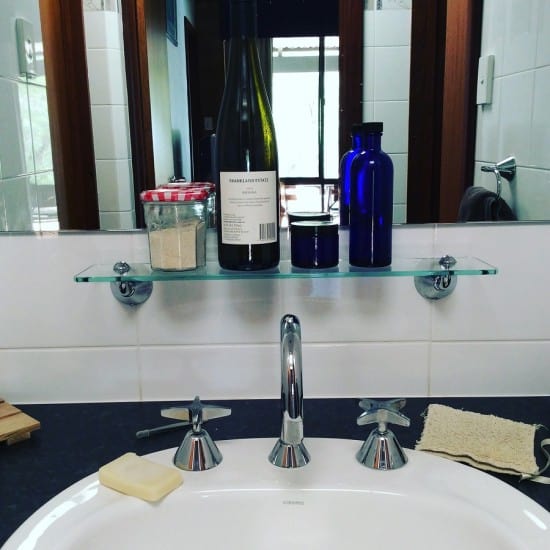
A friend of mine tried bicarb and vinegar hair-washing, and kept the diluted vinegar ready in a bottle in the shower. I don’t do this because I learned the hard way that vinegar + hot water is a much more pleasant experience than vinegar + cold water. I would only do this if I lived somewhere so hot I wanted a cold shower.
Aren’t you meant to use apple cider vinegar?
I use regular white vinegar. I know that apple cider vinegar is commonly cited as the vinegar to use, and I’ve tried it, but I prefer white vinegar. I find apple cider vinegar leaves my hair duller. Apple cider vinegar is slightly less acidic than white vinegar, but I’m diluting 1:8 times with water, and rinsing off after a minute or less.
Don’t you smell of vinegar?
Actually, no. If you’re worried about smell, white vinegar dissipates almost instantly upon rinsing. Apple cider vinegar will take a little longer. The first time I ever tried this I was paranoid that I smelled like fish and chips, but I think it was just that my hair is much closer to my nose than anyone else’s.
If you’re really worried about smell, or miss the fragrance of traditional shampoo, you can add a 1-2 drops essential oil to the vinegar before applying.
How often do you wash your hair?
I wash my hair every 3-5 days. Not so much because my hair gets greasy, but because the curls start to look straggly. If it’s only been 3 days, I might omit the bicarb step and just do the vinegar rinse.
Will my hair fall out?
There was an article going around the internet, stating that using bicarb and vinegar to wash your hair will make it fall out. I’ve written my thoughts on that here. There’s no reason why using bicarb or vinegar to wash hair would cause hair loss.
After 3+ years, I still have a full head of hair.
You mentioned rye flour. How does that work?
Instead of using bicarb, I’ve also used rye flour to wash my hair. Bicarb is a salt, and is mined from the ground. Rye flour is ground from rye, a plant. Sustainable speaking, rye is probably the more eco-friendly option. It also leaves my hair much shinier than bicarb. Plus, as it’s not water soluble, it mixes with water to form a paste which is much easier to apply to your hair.
On the down side, if you aren’t careful you can end up with huge flakes of rye flour that look like brown dandruff. Believe me, discovering chunks of flour falling out of your hair as you ruffle it is quite alarming.
To reduce this, you can sieve the flour before you use it (a tea strainer will likely have the finest mesh). Also, post washing, be sure to towel dry your hair really well. And never ever apply to dry hair, or you will end up with a flour crust on your scalp!
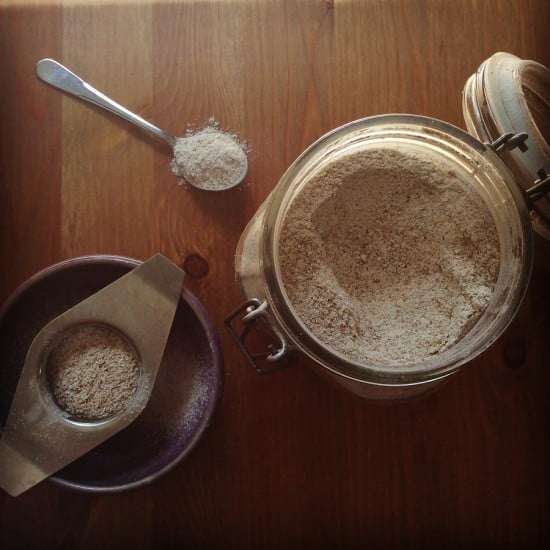
Anything else?
If you’re switching from regular shampoo, your hair will take some time to adjust. Regular shampoo tends to strip oil from the scalp, so the skin compensates by making more oil. Some people find when they first use this that they have oily hair for a few days, or even a few weeks. Push through!
Ultimately though, this isn’t for everybody. It works particularly well on people with curly hair. If you’ve tried for a few months and you still don’t like it, maybe it’s not for you. Don’t worry, there are plenty of other options.
If you haven’t tried it, I definitely recommend you give it a go! There’s something very satisfying about personal care products that come from the pantry and with single ingredients.
Can I tempt you?!
Now I’d love to hear from you! Have you tried the bicarb and vinegar method? Do you love it? Did you hate it? Are you tempted to give it a go? Please share your thoughts in the comments below!
[leadpages_leadbox leadbox_id=1429a0746639c5] [/leadpages_leadbox]

